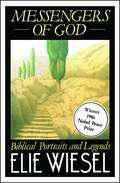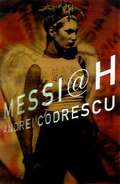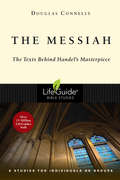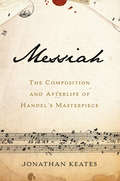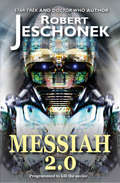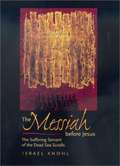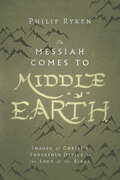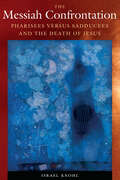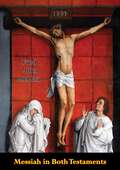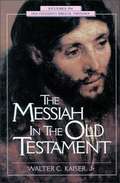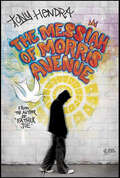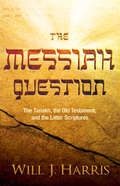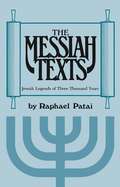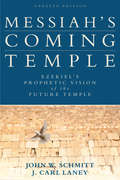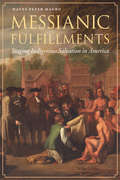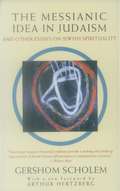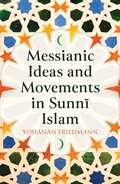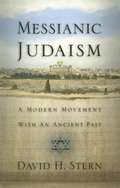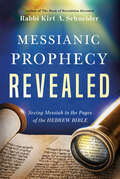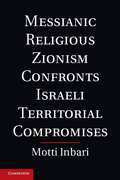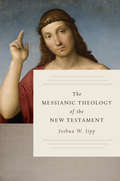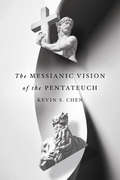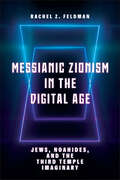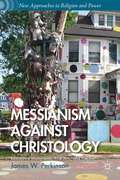- Table View
- List View
Messenger's Angel: Lost Angels Book 2 (Lost Angels)
by Heather Killough-WaldenFor fans of J. R. Ward, Nalini Singh and Charlaine Harris, the second novel in The Lost Angels from New York Times bestselling author Heather Killough-Walden. Are you ready to meet the angels of your dreams?Gabriel has always called Scotland his true home. Nevertheless, he is stunned when his archess suddenly appears in the land closest to his heart.Juliette Andersen's encounter with the gorgeous silver-eyed stranger changes their worlds for ever. But even as they find each other, enemies surround them. With danger closing in, they will have one chance to fulfil a destiny written for them in the stars...The Lost Angels will compell you into a world of desire, danger and devastation. Read the whole series: Always Angel, Avenger's Angel, Messenger's Angel, Death's Angel, Warrior's Angel and Samael.
Messengers of God: A True Story of Angelic Presence and the Return to
by Elie WieselElie Wiesel’s classic look at Job and seven other Biblical characters as they grapple with their relationship with God and the question of his justice.“Wiesel has never allowed himself to be diverted from the role of witness for the martyred Jews and survivors of the Holocaust, and by extension for all those who through the centuries have asked Job's question: ‘What is God doing and where is His justice?’ Here in a masterful series of mythic portraits, drawing upon Bible tales and the Midrashim (a body of commentary), Wiesel explores ‘the distant and haunting figures that molded him’: Adam, Cain and Abel, Abraham and Isaac, Jacob, Joseph, and Job. With the dramatic invention of a Father Mapple and the exquisite care of a Talmudic scholar, Wiesel interprets the wellsprings of Jewish religious tradition as the many faces of man’s greatness facing the inexplicable. In an intimate relationship with God it is possible to complain, to demand. Adam and Eve in sinning “cried out” against the injustice of their entrapment; Cain assaulted God rather than his brother; and Abraham's agreement to sacrifice his son placed the burden of guilt on Him who demanded it. As for Job, Wiesel concludes that he abdicated his defiance as did the confessing Communists of Stalin’s time to ‘underline the implausibility’ of his trial, and thus become the accuser. Wiesel’s concern with the imponderables of fate seems to move from strength to strength” (Kirkus Reviews).
Messiah: A Novel
by Andrei CodrescuFrom the author of the acclaimed and ravishing "The Blood Countess" comes "Messiah," a novel chronicling the onset of millennial fever and the universal yearning for a "Messiah." Set against a backdrop of warring religious fundamentalist factions, social upheaval, and mystical inspiration, "Messiah" combines Codrescu's sonorous prose with mordant social commentary and incandescent characters. "Messiah" combs through the artifacts of American millennial culture with adroit examinations of cyberspace, fundamentalist religion, sex, and the cult of celebrity. Set from December 1999 to Mardi Gras 2000, "Messiah" introduces two remarkable young women: Felicity, a girl detective in New Orleans, and Andrea, a Sarajevan orphan who has found asylum in Jerusalem after internment in a Serbian POW camp. Felicity and Andrea, both presciently self-aware, come to believe they are the two severed halves of a whole entity, eventually finding each other amid the chaos of millennial fervor. Their special mission: to fulfill an extraordinary destiny as Armageddon sweeps the earth.
The Messiah: The Texts Behind Handel's Masterpiece (LifeGuide Bible Studies)
by Douglas ConnellyProphets prophesied about him. Angels and shepherds rejoiced at his birth. Friends cried for joy at his resurrection. And we still celebrate him today. He is Jesus, the Messiah. Perfect for Advent or Lent, this eight-session LifeGuide Bible Study guide explores some of the key passages in the Old Testament about the Messiah and their completion in the life and saving work of Jesus. These passages have had a profound effect on the imagination and worship of Christians for two thousand years, leading George Frederic Handel to write one of the greatest expressions of worship and adoration—his oratorio, the Messiah. We hear parts of it sung every year during the Christmas season, but what many listeners fail to realize is that the entire text of Handel's Messiah is drawn from Scripture—and many of the Old Testament passages that shaped Israel's hope for their Redeemer are included in that text. This guide leads you through Scripture passages used in Handel's work that highlight who Jesus is and what he came to do. It might change the way you listen to the Messiah. Even more, it might change the way you live. For over three decades LifeGuide Bible Studies have provided solid biblical content and raised thought-provoking questions—making for a one-of-a-kind Bible study experience for individuals and groups. This series has more than 130 titles on Old and New Testament books, character studies, and topical studies.
Messiah: The Composition and Afterlife of Handel's Masterpiece
by Jonathan KeatesFrom Handel's renowned biographer, the story of one of the most celebrated compositions of Western classical music, Handel's famous oratorio, Messiah In the late summer of 1741, George Friderick Handel, composed an oratorio set to words from the King James Bible, rich in tuneful arias and magnificent choruses. Jonathan Keates recounts the history and afterlife of Messiah, one of the best-loved works in the classical repertoire. He relates the composition's first performances and its relationship with spirituality in the age of the Enlightenment, and examines how Messiah, after Handel's death, became an essential component of our musical canon. An authoritative and affectionate celebration of the high-point of the Georgian golden age of music, Messiah is essential reading for lovers of classical music.
Messiah 2.0
by Robert T. Jeschonek Ben BaldwinWhat form will the Second Coming of Christ take? In the world of the far future, Father Clement the warrior priest and Imago the stained glass robot will stop at nothing to find Him...so they can kill Him. It's the only way to save the King of the World and his Kingdom from the great threat predicted in the Book of Revelations. Guided by the ultra-high tech Christputer, armed with an atomic scythe and righteous robotic power, Clement and Imago track the last of the proto-Christs through the realms of the savage Undead. Will a mysterious prisoner lead the way to their target Messiah, or will she help them realize they're serving an evil cause? In the world of tomorrow, Christ and Antichrist both take forms that no one expects and pit technological marvels in a futuristic clash that no one can imagine. Don't miss this exciting tale by award-winning storyteller Robert T. Jeschonek, a master of unique and unexpected science fiction that really packs a punch.
The Messiah Before Jesus: The Suffering Servant of the Dead Sea Scrolls
by Israel Knohl David MaiselOn the basis of hymns found among the Dead Sea Scrolls, Knoll argues that one generation before Jesus, a messianic leader arose in the Qumran sect who was regarded by his followers as ushering in an area of redemption and forgiveness. He was killed by Roman soldiers in 4 B.C.E., and his followers believed he was resurrected after three days and rose to heaven.
The Messiah Comes to Middle-Earth: Images of Christ's Threefold Office in The Lord of the Rings (Hansen Lectureship Ser.)
by Philip RykenHow can we grasp the significance of what Jesus Christ did for us? Might literature help us as we seek to understand the Christian faith?J.R.R. Tolkien’s The Lord of the Rings has generated much discussion about the relationship between Christianity and literature. It is well known that Tolkien disliked allegory. Yet he acknowledged that his work is imbued with Christian symbolism and meaning.Based on the inaugural Hansen Lectureship series delivered at the Marion E. Wade Center by Philip Ryken, this volume mines the riches of Tolkien’s theological imagination. In the characters of Gandalf, Frodo, and Aragorn, Ryken hears echoes of the threefold office of Christ—his prophetic, priestly, and royal roles. Guided by Ryken, readers will discover that they can learn much about the one who is the true prophet, priest, and king through Tolkien's imaginative storytelling.
The Messiah Confrontation: Pharisees versus Sadducees and the Death of Jesus
by Dr. Israel KnohlThe Messiah Confrontation casts new and fascinating light on why Jesus was killed. Grounded in meticulous research on the messianism debates in the Bible and during the Second Temple period, biblical scholar Israel Knohl argues that Jesus&’s trial was in reality a dramatic clash between two Jewish groups holding opposing ideologies of messianism and anti-messianism, with both ideologies running through the Bible. The Pharisees (forefathers of the rabbinic sages) and most of the Jewish people had a conception of a Messiah similar to Jesus: like the prophets and most psalmists, they expected the arrival of a godlike Messiah. However, the judges who sentenced Jesus to death were Sadducees, who were fighting with the Pharisees largely because they repudiated the Messiah idea. Thus, the trial of Jesus was not a clash between Jewish and what would become Christian doctrines but a confrontation between two internal Jewish positions—expecting a Messiah or rejecting the Messiah idea—in which Jesus and the Pharisees were actually on the same side. Knohl contends that had the assigned judges been Pharisees rather than Sadducees, Jesus would not have been convicted and crucified. The Pharisees&’ disagreement with Jesus was solely over whether Jesus was the Messiah—but historically, for Jews, arguing about who was or wasn&’t the Messiah was not uncommon.The Messiah Confrontation has far-reaching consequences for the relationship between Christians and Jews.
Messiah in Both Testaments
by Fred John MeldauThis work identifies some of the major messianic prophecies of the Old Testament and shows their New Testament fulfillment in Christ.“THE MOST AMAZING DRAMA that ever was presented to the mind of man—a drama written in prophecy in the Old Testament and in biography in the four Gospels—is the narrative of Jesus the Christ. One outstanding fact, among many, completely isolates HIM. It is this: that one Man only in the history of the world has had explicit details given beforehand of His birth, life, death and resurrection; that these details are in documents given to the public centuries before He appeared, and that no one challenges, or can challenge, that these documents were widely circulated long before His birth; and that anyone and everyone can compare for himself the actual records of His life with those old documents, and find that they match one another to a nicety. The challenge of this pure miracle is that it happened concerning one Man only in the whole history of the world” (D. M. Panton).To focus attention on the unparalleled wonder of this literary miracle, think for a moment: who could have prewritten a life of George Washington or Abraham Lincoln, or any other character, five hundred years before he was born? Nowhere in any of the literature of the world, secular or religious, can one find a duplicate to the astounding miracle of the prewritten life of Christ. “The inspiration of that portrait came from the Heavenly Gallery, and not from the studio of an earthly artist” (A. T. Pierson). So amazing is this miracle of the pre-written life of Christ and its perfect fulfillment in Jesus of Nazareth that “Nothing but Divine prescience could have foreseen it, and nothing but Divine power could accomplish it.” As the full evidence is presented, all thoughtful readers will agree that “the prophecy came not in old time by the will of man, but holy men of God spake as they were moved by the Holy Spirit” (2 Pet. 1:21).
The Messiah In The Old Testament
by Walter C. KaiserOld Testament texts that point to the coming of the Messiah are traditionally interpreted either from the viewpoint of their New Testament fulfillment (evangelicalism) or their linguistic and grammatical distinctiveness within the Hebrew Bible (non-conservative). The Messiah in the Old Testament considers another important line of interpretation that has been neglected in building an Old Testament theology. It approaches Israel's concept of the Messiah as a developing theme and shows how a proper grasp of the textual meaning at each stage of Old Testament revelation is necessary for understanding messianic prophecy. Beginning in the Pentateuch and working through the Old Testament to the Minor Prophets, the author delineates texts that are direct messianic prophecies and examines their meaning and development within the flow of God's plan. The reader will gain an understanding of God's process for bringing the Messiah to earth through the nation of Israel, and of his intent to bring the saving knowledge of Christ to the World through them.
The Messiah of Morris Avenue
by Tony HendraIn The Messiah of Morris Avenue, Tony Hendra—the acclaimed satirist and New York Times bestselling author of Father Joe—poses the question: would we recognize the messiah if he appeared today? And delivers, in the words of Frank McCourt, “just what the country needs now—a good dose of merriment in the face of crawthumping righteousness.”In the not so distant future, the tide of righteousness—in the form of executions, barking evangelists, tank-like SUVs, and a movie industry run entirely by the Christian right—has swept the nation. Aside from the non-white, the non-Christian, and the non-wealthy, all are believers.Among the skeptics is a washed-up journalist named Johnny Greco, who hears of a media-shy young man known as “Jay” roaming through ghettos, healing the sick, and tossing off miracles. Soft-spoken and shabbily dressed, Jay is an unlikely savior for this anxious and intolerant America.But as he makes his rounds, gathers followers, and makes furious enemies among the righteous powers that be, Johnny finds it harder and harder to doubt him.
The Messiah Question: The Tanakh, the Old Testament, and the Latter Scriptures
by Will J. HarrisFor the last two thousand years, three unanswerable questions have perplexed Jewish religious scholars: When will Messiah appear? (Jews, in general, do not believe He has come.)Why were the Jews dispersed from their nation for two thousand years? (Israel&’s statehood was only recently restored, in 1948.)When in the biblical timeline does Messiah appear? (Again, most Jews are still waiting for Messiah to come the first time.) The Messiah Question answers each question by exploring the Tanakh (Jewish Bible), historical rabbinical commentary, &“Latter Scriptures&” (New Testament), and Bible prophecies, explaining Messiah&’s appearance in both the Tanakh and rabbinical texts. Thus The Messiah Question is a great witnessing tool for Messianic Jews or Gentile believers seeking to reach unbelieving Jews for Yeshua (Jesus). It will amplify your knowledge of the Old Testament and fortify your faith in God&’s plan for humanity.
The Messiah Texts: Jewish Legends of Three Thousand Years
by Raphael PataiFollowing a detailed introduction to the world of messianic ideology and its significance in Jewish history, The Messiah Texts traces the progress of the messianic legend from its biblical beginnings to contemporary expressions.Renowned scholar Raphael Patai has skillfully selected passages from a voluminous literature spanning three millennia. Using his own translations from Hebrew, Aramaic, Arabic, Latin, and other original texts, Patai excerpts delightful folk tales, apocalyptic fantasies, and parables of prophetic power. All are central to the understanding of a magnificent heritage. patai also investigates the false messiahs who have appeared throughout Jewish history, the modern Messiah-influenced movements such as reform Judaism and Zionism, and the numerous reasons put forth by the various branches of Judaism as to why the Messiah has not yet appeared.
Messiah's Coming Temple: Ezekiel's Prophetic Vision of the Future Temple
by John W. Schmitt J. Carl LaneyOne of the Old Testament's most enigmatic prophecies is Ezekiel's vision of a new, restored temple in Jerusalem. What would a restored temple be like? How would it operate? And when might it be built? These and many other intriguing questions are addressed in this newly updated and expanded work based on extensive research and discussions with leading Jewish leaders and rabbis in the United States and Israel Messiah's Coming Temple provides a thorough vision of this future center of worship during the coming messianic kingdom. Along with biblical interpretation of the key prophecies of Ezekiel regarding Messiah's coming temple, the work includes photos and descriptions based on a unique and detailed model of the future temple.
Messianic Fulfillments: Staging Indigenous Salvation in America
by Hayes Peter MauroIn Messianic Fulfillments Hayes Peter Mauro examines the role of Christian evangelical movements in shaping American identity in the seventeenth, eighteenth, and nineteenth centuries. Focusing on Christianity’s fervent pursuit of Native American salvation, Mauro discusses Anglo American artists influenced by Christian millenarianism, natural history, and racial science in America. Artists on the colonial, antebellum, and post–Civil War frontier graphically projected their idealization of Christian-based identity onto the bodies of American Indians.Messianic Fulfillments explores how Puritans, Quakers, Mormons, and members of other Christian millenarian movements viewed Native peoples as childlike, primitive, and in desperate need of Christianization lest they fall into perpetual sin and oblivion and slip into eternal damnation. Christian missionaries were driven by the idea that catastrophic Native American spiritual failure would, in Christ’s eyes, reflect on the shortcomings of those Christians tasked with doing the work of Christian “charity” in the New World. With an interdisciplinary approach drawing from religious studies and the histories of popular science and art, Messianic Fulfillments explores ethnohistorical encounters in colonial and nineteenth-century America through the lens of artistic works by evangelically inspired Anglo American artists and photographers. Mauro takes a critical look at a variety of visual mediums to illustrate how evangelical imagery influenced definitions of “Americaness,” and how such images reinforced or challenged historically prevailing conceptions of what it means (and looks like) to be American.
The Messianic Idea in Judaism: And Other Essays on Jewish Spirituality
by Gershom ScholemGershom Scholem was the master builder of historical studies of the Kabbalah. When he began to work on this neglected field, the few who studied these texts were either amateurs who were looking for occult wisdom, or old-style Kabbalists who were seeking guidance on their spiritual journeys. His work broke with the outlook of the scholars of the previous century in Judaica--die Wissenschaft des Judentums, the Science of Judaism--whose orientation he rejected, calling their "disregard for the most vital aspects of the Jewish people as a collective entity: a form of "censorship of the Jewish past." The major founders of modern Jewish historical studies in the nineteenth century, Leopold Zunz and Abraham Geiger, had ignored the Kabbalah; it did not fit into their account of the Jewish religion as rational and worthy of respect by "enlightened" minds. The only exception was the historian Heinrich Graetz. He had paid substantial attention to its texts and to their most explosive exponent, the false Messiah Sabbatai Zevi, but Graetz had depicted the Kabbalah and all that flowed from it as an unworthy revolt from the underground of Jewish life against its reasonable, law-abiding, and learned mainstream. Scholem conducted a continuing polemic with Zunz, Geiger, and Graetz by bringing into view a Jewish past more varied, more vital, and more interesting than any idealized portrait could reveal.--from the Foreword by Arthur Hertzberg, 1995From the Trade Paperback edition.
Messianic Ideas and Movements in Sunni Islam
by Yohanan FriedmannExpectation of a redeemer is a widespread phenomenon across many civilizations. Classical Islamic traditions maintain that the mahdi will transform our world by making Islam the sole religion, and that he will do so in collaboration with Jesus, who will return as a Muslim and play a major role in this apocalyptic endeavour. While the messianic idea has been most often discussed in relation to Shi&‘i Islam, it is highly important in the Sunni branch as well. In this groundbreaking work, Yohanan Friedmann explores its roots in Sunni Islam, and studies four major mahdi claimants – Ibn Tumart, Sayyid Muhammad Jawnpuri, Muhammad Ahmad and Mirza Ghulam Ahmad – who made a considerable impact in the regions where they emerged. Focusing on their religious thought, and relating it to classical Muslim ideas on the apocalypse, he examines their movements and considers their achievements, failures and legacies – including the ways in which they prefigured some radical Islamic groups of modern times.
Messianic Judaism: A Modern Movement with an Ancient Past
by David H. Stern"In the first century of the Common Era, tens of thousands of Jewish people followed Yeshua (Jesus), believing him to be the promised Messiah of Israel. They didn't renounce their heritage, their customs, nor their people. They remained Jews. Two thousand years later, hundreds of thousands of Jewish people follow Yeshua, also believing that he was the Messiah. They, too, have not renounced their heritage, customs, nor their people. Messianic Judaism is the modern movement that is bringing it all together, for Jews and non-Jews. This book answers the following questions and more: [1] What happened in the past 2000 years? [2] Is Messianic Judaism a prophetic movement? [3] What do Messianic Jews believe? [4] Did the Torah, the Five Books of Moses, become null and void? [5] What are the challenges for the future of this Movement? In easy-to-read style, Dr. David H. Stern, translator of the Jewish New Testament and Complete Jewish Bible, author of books and articles, teacher and thinker, gives us a comprehensive look at this vital movement. Whether you are a Messianic Jew, yourself, a Christian with curiosity about the Jewish roots of the Faith, or, a Jewish person wanting to understand more, Messianic Judaism: A Modern Movement with an Ancient Past puts it all in perspective for you. Read by tens of thousands in its first version (Messianic Jewish Manifesto), this book has been instrumental in shaping and challenging Messianic Judaism. Now, in this new edition, Dr. Stern lovingly challenges us again."
Messianic Prophecy Revealed: Seeing Messiah in the Pages of the Hebrew Bible
by Rabbi Kirt SchneiderFROM THE AUTHOR OF THE BOOK OF REVELATION DECODEDThe Old Testament isn&’t just a collection of traditions from one group of people—it&’s about Jesus as the key to salvation. After reading this book, you will have no doubts that Jesus is the Messiah, and you will be able to read the Old Testament with the newfound revelation that God has been pointing to His Son as the Savior of the world for thousands of years.Many times, when inquisitive readers look to see how the New Testament authors applied the Old Testament to show that Jesus is the Messiah, they become confused. When the Gospel writers quote Old Testament scriptures and say, &“This is how Jesus fulfilled it,&” the passage quoted doesn&’t appear to be a prophecy at all. This is because understanding Messianic prophecy is often more of an art than a science. Messianic prophecy is not simply the measurement of specific prophecies about the future that Jesus fulfilled. In the Hebrew tradition, prophecy is not one-dimensional; it is not simply foretelling the future. In reality, the whole of Scripture is prophetic, pointing us to Christ. In Messianic Prophecy Revealed, Rabbi Kirt A. Schneider takes readers through the Word of God, showing them how the New Testament writers took passages out of the Old Testament to prove that Jesus is indeed the Messiah. It&’s a subject that sounds simple but is, in fact, more complex than many realize. This book will show followers of Jesus why they can have absolute confidence that Jesus is who He claimed to be—the Messiah.
Messianic Religious Zionism Confronts Israeli Territorial Compromises
by Motti InbariThe Six Day War in 1967 profoundly influenced how an increasing number of religious Zionists saw Israeli victory as the manifestation of God's desire to redeem God's people. Thousands of religious Israelis joined the Gush Emunim movement in 1974 to create settlements in territories occupied in the war. However, over time, the Israeli government decided to return territory to Palestinian or Arab control. This was perceived among religious Zionist circles as a violation of God's order. The peak of this process came with the Disengagement Plan in 2005, in which Israel demolished all the settlements in the Gaza Strip and four settlements in the West Bank. This process raised difficult theological questions among religious Zionists. This book explores the internal mechanism applied by a group of religious Zionist rabbis in response to their profound disillusionment with the state, reflected in an increase in religious radicalization due to the need to cope with the feelings of religious and messianic failure.
The Messianic Theology of the New Testament
by Joshua W. JippOne of the earliest Christian confessions—that Jesus is Messiah and Lord—has long been recognized throughout the New Testament. Joshua Jipp shows that the New Testament is in fact built upon this foundational messianic claim, and each of its primary compositions is a unique creative expansion of this common thread. Having made the same argument about the Pauline epistles in his previous book Christ Is King: Paul&’s Royal Ideology, Jipp works methodically through the New Testament to show how the authors proclaim Jesus as the incarnate, crucified, and enthroned messiah of God. In the second section of this book, Jipp moves beyond exegesis toward larger theological questions, such as those of Christology, soteriology, ecclesiology, and eschatology, revealing the practical value of reading the Bible with an eye to its messianic vision. The Messianic Theology of the New Testament functions as an excellent introductory text, honoring the vigorous pluralism of the New Testament books while still addressing the obvious question: what makes these twenty-seven different compositions one unified testament?
The Messianic Vision of the Pentateuch
by Kevin S. ChenDid Moses write about Jesus?The Messianic Vision of the PentateuchThe Messianic Vision of the Pentateuch
Messianic Zionism in the Digital Age: Jews, Noahides, and the Third Temple Imaginary
by Rachel Z. FeldmanJudaism in the twenty-first century has seen the rise of the messianic Third Temple movement, as religious activists based in Israel have worked to realize biblical prophecies, including the restoration of a Jewish theocracy and the construction of the third and final Temple on Jerusalem’s Temple Mount. Through groundbreaking ethnographic research, Messianic Zionism in the Digital Age details how Third Temple visions have gained considerable momentum and political support in Israel and abroad . The role of technology in this movement’s globalization has been critical. Feldman skillfully highlights the ways in which the internet and social media have contributed to the movement's growth beyond the streets of Jerusalem into communities of former Christians around the world who now identify as the Children of Noah (Bnei Noah). She charts a path for future research while documenting the intimate effects of political theologies in motion and the birth of a new transnational Judaic faith.
Messianism Against Christology
by James W. PerkinsonMessianism Against Christology: Resistance Movements, Folk Arts and Empire is a work committed to re-thinking the Christian tradition from the point of view of messianic movements of eco-sustainability and social justice rather than magnified individuals. Framed by considerations of political struggle and insurgent folk art in contemporary Detroit and ancient Ethiopia, the work concentrates its attention on the biblical tradition, teasing out memories of pastoral nomad resistance not entirely erased by the repressions of agricultural empires, that are revitalized in the prophetic movements of Elijah, the Baptist and Jesus. It also underscores the relevance of these "little tradition" practices for eco-politics and indigenous solidarity efforts today.

